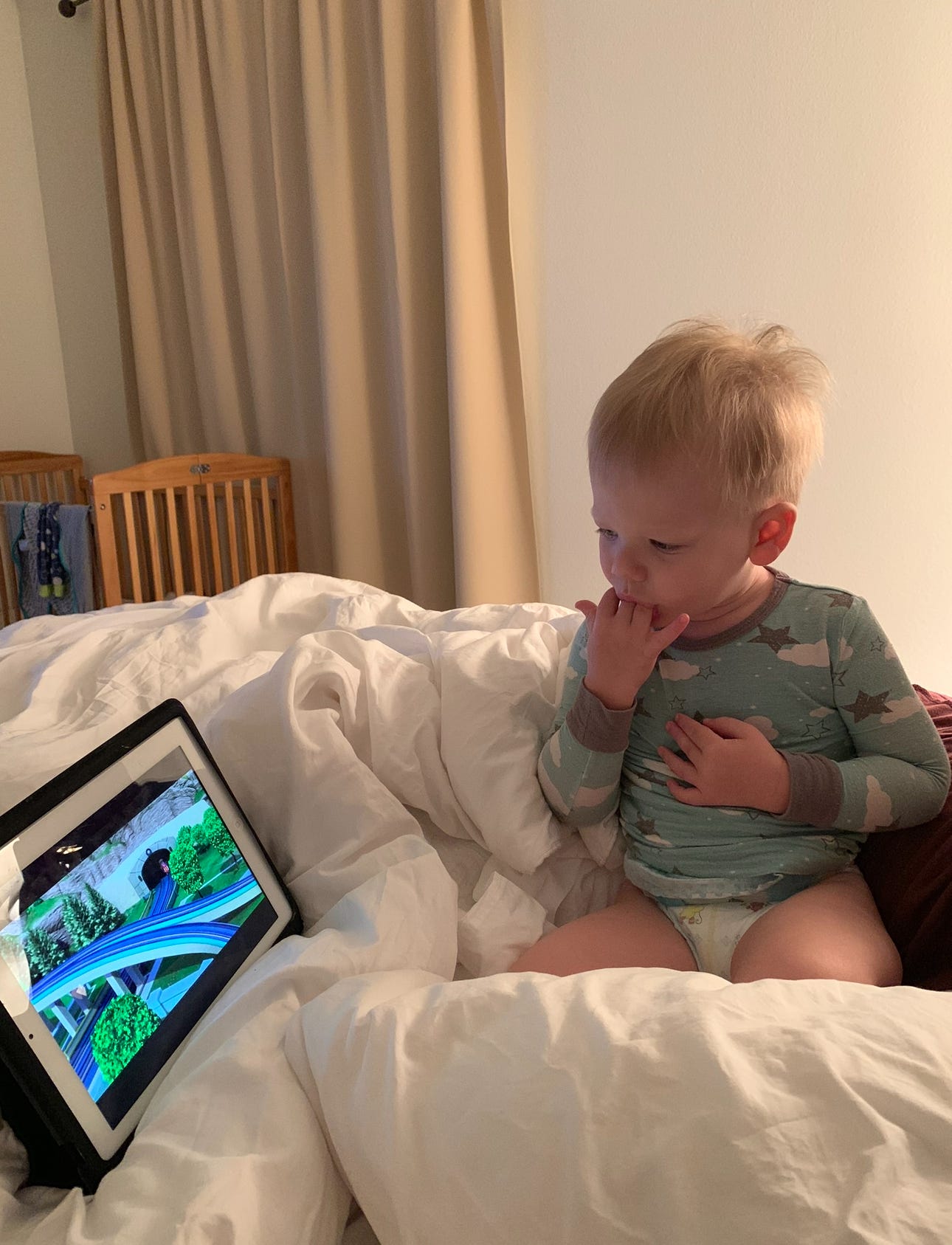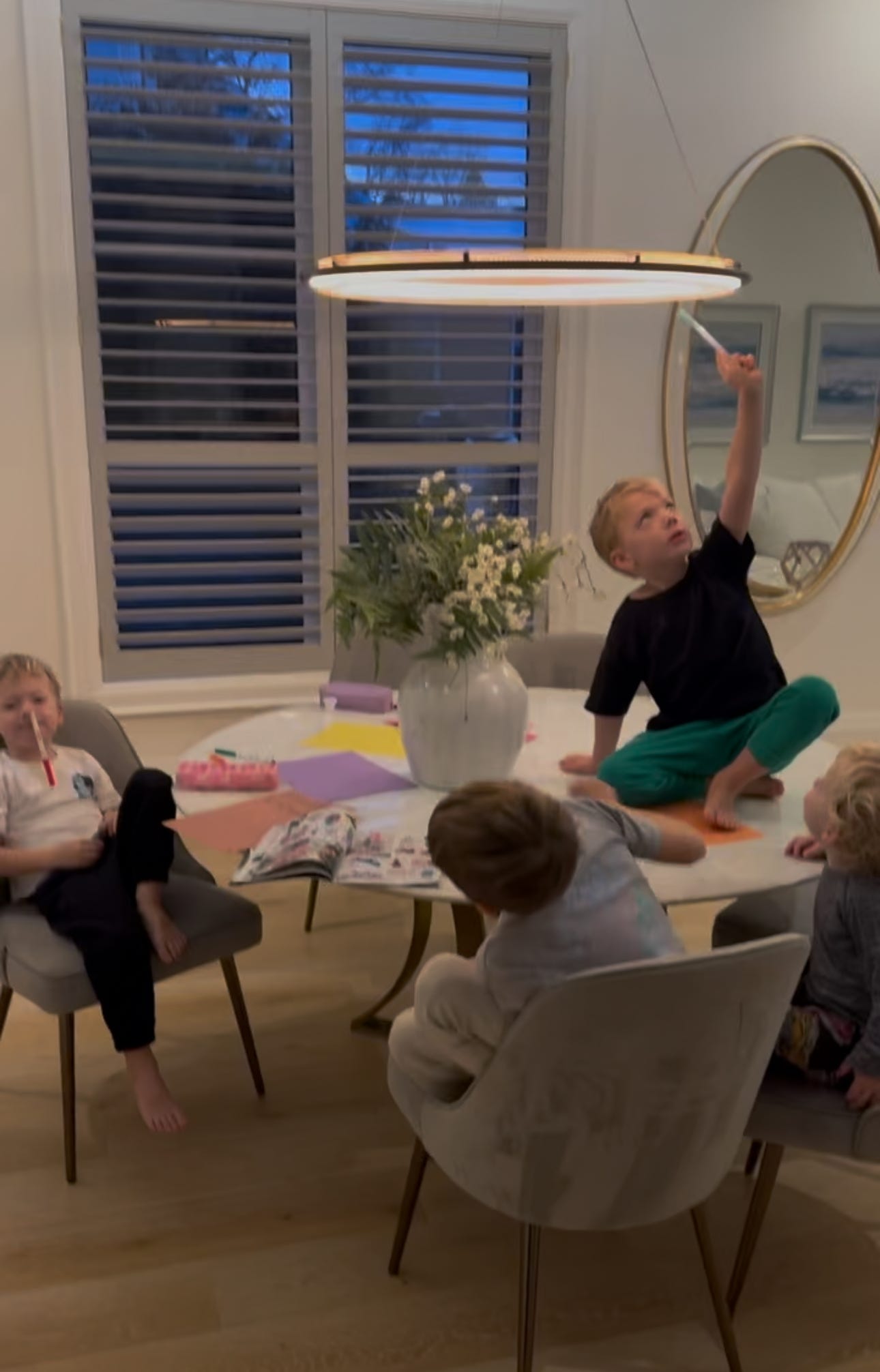One Year Without Screens: The Best Parenting Decision We’ve Ever Made
A year ago, we took away the iPads and pulled the plug on the TV.
Honestly, it wasn’t part of some grand parenting plan. No i’s were dotted, no t’s crossed. It happened on a whim (like most of our parenting strategy—just flying by the seat of our pants) 😂
We had just returned from an incredible resort. After a four-hour flight where the kids were glued to their iPads, we landed, excited to explore. But the very first thing they asked when we got to our room?
“Can we have our iPads?”
That moment hit us hard—these things are so addicting. The next few days were filled with constant begging: “Can we have our iPads?” It was one of the most eye-opening experiences of our parenting journey.
A few days later, we were back home. The boys woke up and, like clockwork, asked to watch TV the moment they opened their eyes. And right then, we had this deep gut feeling that something had to change. So, in true last-minute parenting fashion, we unplugged the TVs and put away the iPads.
We told the boys, “The screens are going away.”
Fast forward one year later, and we can say this with absolute certainty:
Removing screens has been the single best parenting decision we’ve ever made.
Our boys play more. They imagine more. They argue less. They get dressed quicker. They explore outside like never before. They’re more content. More creative. More present.
And so are we.
So with that said, here’s a quick look at what going screen-free has been like for our family—the good, the messy (spoiler: the chaos that comes with going screen-free is not for the faint of heart), and some truly eye-opening facts about screens and child development.
Let’s dive in!
First, we had to acknowledge screens were our “parenting crutch”
Looking back, this past year has shown us something we never realized: we were using screens as a parenting crutch—a way to “switch off” when things got tough. But in hindsight, that crutch was actually making everything harder.
The moment our kids got bored, restless, or whiny, we’d hand them a screen.
And slowly but surely, they were being pulled into a constant chase for digital dopamine.
Let’s be clear—this isn’t a judgment on anyone who uses screens. We used them for years with Hudson and the twins!
Honestly, I never thought we’d be “those parents”.
But here we are. And if there’s one thing we really want to share today, it’s this: the downsides of screens aren’t just opinion—they’re backed by a growing body of modern research.
And if you're anything like us, you probably had no idea just how many negative effects screen time can have on childhood development.
So here’s a quick overview of what we’ve learned (brace yourselves—it’s not exactly a feel-good section).
The Research Is Clear—and Getting Louder
Here’s a stat that stopped me in my tracks: 40% of two-year-olds own an iPad. Even more shocking? 48% of adolescents say they’re online almost the entire time they’re awake. That means nearly half of our kids are spending the majority of their lives disconnected from the real world (truthfully, I think on a personal note witnessing this with our boys was my main motivator for going no screens. It killed me seeing them sit on the couch glued to the TV).
It’s no surprise then that adolescent suicides have increased by 140% since 2010.
The list of alarming statistics goes on and on—and Jonathan Haidt’s book, The Anxious Generation, lays it all out. He draws a direct connection between the explosion of youth mental health issues and the rise of smartphones and tablets—especially starting around 2012.
“In the early 2010s, childhood changed. The playground was replaced by the phone. Play-based childhood turned into phone-based childhood.” — Jonathan Haidt
Haidt identifies four essential pillars of a healthy childhood that are being eroded by screen time:
Independent free play
Face-to-face interaction
Sleep
Focus and attention
Jean Twenge, author of iGen, puts it even more bluntly:
“There’s not a single exception: All screen activities are linked to less happiness, and all non-screen activities are linked to more happiness.”
Abigail Shrier, in Bad Therapy, adds:
“Modern parenting culture has pathologized normal childhood behavior while outsourcing key elements of child-rearing to screens and specialists.”
And Nicholas Kardaras, author of Glow Kids, warns:
“We now have clinical research correlating screen tech with disorders like ADHD, addiction, anxiety, depression, increased aggression, and even psychosis.”
“Are we still raising kids, or just managing their screen time?”
Let me be clear—this isn’t an attack if your kids use screens. We were right there with you.
The good news? You can’t fix what you don’t know is broken. That’s what opened our eyes and started us down this screen-free path. In the early years of parenting, we were totally unaware of the research or the consequences. But once we saw the shift in our boys' behavior—and started learning more—we knew something had to change.
And the best part is: it’s never too late to make that change.
What Life Looks Like Now
So what does life actually look like, one year later?
Let us be super clear… life is still chaotic 😂
But here’s the difference: without screens running the show, everything feels lighter. Easier. And more joyful.
Our boys have transformed in the best ways imaginable—and honestly, it’s hard to put into words just how much life has changed. But here’s a quick snapshot:
Mornings are smoother.
There’s way less whining and way more playing. One of my personal favorite moments? Hearing the boys laugh and play together at 6 a.m. (yes, they’re early risers). That time used to be spent quietly zoning out on the couch in front of the TV.Fewer fights.
Don’t get me wrong—they still argue. But it happens a lot less than before.Creativity has exploded.
Forts, coloring, drawing, sports (Ashton’s favorite is blasting hockey pucks), and a million ways to entertain themselves… it’s been incredible to watch. This is probably the biggest, most beautiful shift we’ve witnessed.It’s easier to get out the door.
The days of begging for “just 5 more minutes of TV” are gone—and so is the constant battle that came with it.Most importantly—our boys are happier.
And while we’re being honest… most mornings, the house looks like a tornado hit it. Toys everywhere, pillows from fort-building, hockey sticks in the hallway. But for us, that’s a fair tradeoff. A house isn’t meant to be a showroom—it’s meant to be lived in, filled with noise, laughter, and memories.
What surprised us most is that the more we removed screens, the easier parenting became. (Well, except for the constant fort cleanups.)
We feel immense joy watching our kids do what kids are meant to do—climb trees, play imagination games for hours, get muddy, and even pick up hockey sticks before breakfast. Baby Ashton’s already shooting pucks like a champ.
At the end of the day, we now see screens for what they are:
A short-term solution that often creates long-term struggles.
And for us, the tradeoff has been more than worth it.
PSA… It's Not All or Nothing
We get asked all the time:
“What if your kids watch TV at a friend’s house?”
That’s totally fine. We can only control what happens in our home.
When we first removed screens, we went months with zero screen time. Later, we added a family movie night. If the kids are sick? They can watch TV. We’ve found balance.
Now, a year later, our boys probably watch about 30 minutes of TV a week on average.
No YouTube (we’ve found it too addictive and overstimulating)
No iPads
No gaming
A Gentle Reminder Why…
Going “no screens” hasn’t been without its ups and downs. We still find ourselves debating the issue—often.
Take Hudson’s birthday, for example. His number one request? A Nintendo Switch. Some of his friends have one, and many others have PS5s or other gaming consoles.
Brodie and I went back and forth—a lot.
Maybe it wouldn’t be so bad?
Maybe we could manage it?
Maybe just on weekends?
Then came a trip to Barbados with all four boys. A five-hour flight. And we thought, Okay, this is the moment. Let’s dust off the old iPads—just for the plane ride.
We loaded up games and shows and told ourselves, Let’s just see how it goes.
Well… the flight was peaceful.
But it also reminded us—very clearly—why we gave up screens in the first place.
Our boys didn’t look up once.
Five straight hours. Locked in.
It was like their little souls got pulled right into the screens.
It was equal parts horrifying and affirming.
We had made the right call.
Because the truth is, screens pull kids away from the beautiful world around them. And just like the research shows, they limit emotional, social, and cognitive growth.
That flight was a gentle (and powerful) reminder of why we chose this path.
Final Thoughts
Removing screens didn’t just change our kids — it changed us too.
Parenting is ten times more enjoyable now and I say this wholeheartedly. There is no better feeling than witnessing our boys exploring the world around them. It’s not always convenient. But the convenient path often comes with the highest cost.
Something I’ve learned from both rugby and business:
The easy option in the short term usually creates the hardest problems in the long run.
You don’t need to go cold turkey. But if you’ve felt the pull to try... to reclaim a bit of your child’s imagination, focus, and joy — I can promise you, it’s worth it.
One year later, we’re not just surviving without screens —
We’re thriving (and believe me it still baffles me to this day that we are writing about our no screens journey).
If you have questions — how we did it, how we talked to our kids, how we handled the pushback — drop them in the comments. We’ll be answering everything next week!









How did you handle the initial days after no screens?